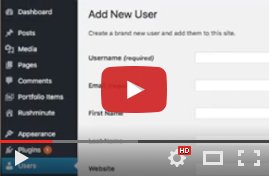A blog for your small business may seem like a weird idea if nobody’s told you how it helps you attract new customers.
The reason for a small business blog is simple: the more content your site generates, the easier it is for potential customers find you online. And though the term blog seems more appropriate for a personal journal (true, the origin of the word blog is “web log”), nowadays most websites have a link to their company blog in their main navigation.
So how do you know if you need one for your small business?
Easy. Answer the following three questions.
Question 1: Do You Want More Website Traffic?
This may seem like a silly question, but a lot of small business folks just have a single page website. They don’t have the time, money and/or need for anything more. Their business is either comfy and stable or their business development is based on word-of-mouth/one-to-one marketing. Investing in a website just isn’t on their radar. The only reason they have a website is to provide contact information, directions and store/office hours.
If you’re one of these lucky folks, here’s the great news: you’re done! No need to read any further. (Yay!)
On the other hand, if you’re looking for more website traffic, sooner or later, you’re gonna need a blog for your business.
What’s Your Shoe Size?
I know that’s a weird question, but bear with me.
The idea here is you need to increase your online footprint. That’s a fancy way of saying you need more and more content and links back to your website.
I basically break small businesses out into two online footprint shoe sizes, so to speak: those with less less than 100 unique visitors a month and those with with around 600 visitors a month. (Sure there are folks with thousands of visitors each month, but I’m not really talking to those folks. I guarantee you they already have a business blog.)
If you don’t know how many online visitors you get each month, you can install the world’s most popular free visitor tracking software by Google Analytics. BTW, if you need help setting it set up on your site, Rushminute’s happy to help, just email us.
If you have less than 100 unique visitors a month, I recommend starting with one blog post a month. If you blog for 6 months to a year, you’ll likely see an uptick in your monthly visits. Now there’s no guarantee you’re going to be pulling in tons of new business from your blog, but you’re laying the foundation for growth. And if you do just one blog posts a month, you’ll end up with 12 new pages on the internet. Google will then reward you with higher search results for the each specific topic you wrote about in your blog.
If you have about 600 unique visitors a month – but still don’t have a blog – I recommend a blog post a week. That’ll give you 50+ new pages for Google to associate with your website in a year. Good for you! You’re now starting to expand your footprint with 50 articles to promote across social media to help you attract new and upset existing customers.
Question 2: Do Your Competitors Have a Blog?
This is easy.
Click on four or five of your closest competitors’ websites and see if they have a blog.
If they do, check out how many blog posts they have. Do they have a few? A ton?
Don’t get freaked out, just note how many they have. All you’re doing is looking around and checking out what’s going on with the competition.
Next, check out how often they post. Do they post every week? Several times a week? Are they current or have they not posted in a while? Maybe none of your competitors are posting – which could be a good thing if you’re ultra-competitive and want to beat them to punch!
Lastly, check out what they’re posting about. Hey, for newbie bloggers, there’s no shame in reverse engineering their blog by checking out their titles/topics.
The main takeaway is that you now know it’s time to step up your game and get blogging!
Question 3: Do Your Competitors Have Social Media Backlinks?
The reason you’re looking at social media is to see how your competitors use their channels to link back to their blog posts. And answering this question is a bit more difficult because different industries use different social media channels. A lot of B2C businesses rely on Facebook and Instagram while B2B service companies tend to use Twitter and LinkedIn.
First, check out which social channels your four or five competitors use. Then for each channel, scan their recent feed to see how often they link back one of their blog posts. Is it several different posts a day? Is it once a week? Never?
Again, you’re trying determine what your competitors are up to. If several of your competitors are linking back to their blog posts, don’t freak out. And if none of your competitors are linking back to their blog, consider it a golden opportunity. The main thing to realize is that you can use social media to drive traffic back to your continually expanding and helpful business blog.
Conclusion
So there ya go. If you answered these three questions, you now know if you need a blog for your business. And, btw, if you need help setting up your blog or writing posts, feel free to drop us an email.
Cheers!
________________
ABOUT THE AUTHOR
Robbie Moore is the founder of Rushminute, a digital marketing agency in Lincoln, Nebraska. With 20+ years of experience in digital marketing, Robbie has worked with dozens of companies and organizations, large and small, around the globe. He also writes extensively about design, development, and business in general.






